The foundation of integrity
Well, welcome back. This is the second section of our introduction.
I think all of us have a story of how someone's lack of integrity has impacted us. Let me ask you a question: What is the best way to limit the spread of corruption?
Would your answer be, 'Well, let's hire more law enforcement officers or maybe more judges, or stricter penalties and deterrents for those who break the law'? Or why not build more prisons or create stronger and clearer policies as deterrents?
So, will severe consequences provide adequate deterrence to stop corruption? Retributive justice, with its fear of punishment, doesn't seem to reverse the trend towards corruption that we're seeing in our world. There's a famous nursery rhyme that goes like this: "Humpty Dumpty sat on a wall; Humpty Dumpty had a great fall. All the king's horses and all the king's men could not put Humpty Dumpty together again." Now, I don't know if you study that nursery rhyme, but it's really quite insightful. There's this gentleman, his name, Mr. Dumpty, and he's facing a significant decision. So, Mr. Dumpty sat on a wall for a while and considered his options. Apparently, he made a bad decision in crawling down off the wall. And Mr. Dumpty ends up by having a great fall.
Now, what's interesting is where Mr. Dumpty goes for help. He doesn't go to his family, or his friends, or even his small group or church. He went to politicians. And we know this, because the king got involved. And not only did the king get involved, but there must have been a meeting of parliament, because they commissioned civil servants. And it says "all the king's horses and all the king's men." So they all got involved. And the government seems to have legislated funding necessary, and commissioned a study, and enacted laws in order to somehow help Mr. Dumpty.
Now, the great tragedy of the nursery rhyme is not Mr. Dumpty's calamity. The tragedy is that all the king's horses and all the king's men couldn't put Mr. Dumpty back together again. So the most powerful people in the land, representing the most powerful institutions in the land, couldn't fix the shattered reality of Mr. Dumpty's life and Mr. Dumpty's world.
I think the nursery rhyme shows us that it will take more than policies, more than funding, more than laws to fix the world. The answer to restoring Mr. Dumpty is what we're looking at in this session. And so there's this Psalm 11:3 statement that says, "If the foundations are destroyed, what can people of integrity do?"
So what can you and I do? It's up to us to make a difference, isn't it? Observing, criticizing, or expecting others to fix the foundation is really not the solution at all. It's time for you and for me to repair and to reinforce the foundations.
Now, many organizations list integrity in their core values. And if you ask them, "Well, how do you measure this integrity that you call a value?", many times they struggle to have any kind of answer. Now, I've studied the subject of integrity for years. And after exploring this topic in books and research and surveys and interviews, and going through the Scriptures, I found that there were 53 aspects of integrity that you can come to understand.
Now, who can remember 53 items? So what I've done is I've taken those 53 aspects and I've condensed them down into six foundational characteristics of integrity. And we call them pillars. And the reason we chose the metaphor of a pillar is because pillars are strong, they're foundational, they're enduring, and often, they're beautiful. And that's how we see integrity.
And so, the six foundational pillars are: Number one, influence. It's how you use power, your authority.
Pillar two, trust. It builds relationships. Are you dependable?
Number three, the pillar of dignity. It establishes your self-worth and your identity.
The pillar of honour encourages potential and releases possibility.
The pillar of truth is about honesty and credibility.
And then there is the pillar of authenticity. True character, being who you really are. And this means viability.
So here's our group question to begin to discuss:
Why have you chosen to take this training on integrity?




